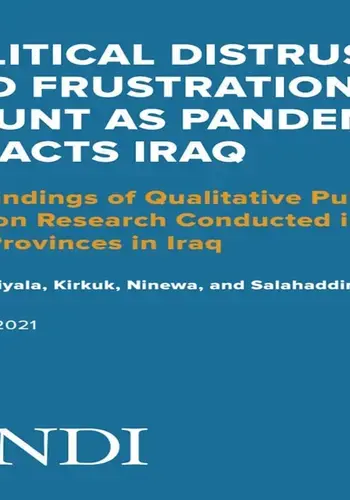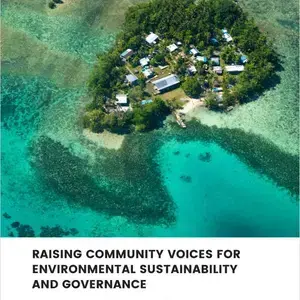With funding provided by the Government of Canada, the National Democratic Institute (NDI or the institute) recently conducted qualitative public opinion research in five provinces in Iraq: Anbar, Diyala, Kirkuk, Ninewa, and Salahaddin. This public opinion research was a follow-up to a public opinion research conducted by NDI in 2019, which also focused on the policy concerns and prioritized issues by Iraqis, particularly related to increasing women’s participation in politics. Results show that the priority issues noted are consistent and demonstrate the deep-seated policy challenges facing the government as well as the long-term concerns of citizens. The stresses and hardships of COVID have made certain issues - such as health care, government assistance, and job opportunities - even more important than they were previously, while also highlighting some issues that were seen as relatively minor in previous years, such as the impact of traditional values on girls.
Other key findings show that the rising economic concerns have led citizens to turn to their own communities for assistance, highlighting the importance in roles such as community groups and Civil Society Organizations (CSOs). Respondents portrayed a situation in Iraq where the government’s shortfalls have stocked an increase in frustration and doubts, while community members have stepped in to bridge the gaps and provide much needed support. Some key findings highlighted the impact that COVID had on women and girls, especially in terms of access to education and household responsibilities.
NDI conducted this research with support from Conflict Management Consulting (CMC) and Thinkbank. The research consisted of 16 focus group discussions (FGDs) and 14 key informant interviews (KIIs), fielded between September 30 and October 19, 2020. Focus groups were held with ‘ordinary citizens’ of urban communities who were to report on the repercussions, needs, and challenges they faced since the pandemic hit the country. In total, the research engaged a sample of 97 respondents – 83 citizens who participated in the focus groups, and 14 community leaders as part of the KIIs.
قام المعهد الديمقراطي الوطني (NDI) وبتمويل من الحكومة الكندية، بإجراء استطلاعاً للرأي العام في خمسة محافظات: الانبار،ديالى، كركوك، نينوى، وصلاح الدين. ويعتبرهذا الاستطلاع جزء من سلسلة استطلاعات الرأي التي قام بتنفيذها المعهد في عام 2019 والتي ركزت على الشوؤن السياسة والقضايا ذات الأولوية للعراقيين، لا سيّما فيما يتعلق بزيادة مشاركة المرأة في السياسة. أوضحت نتائج البحث أن أهم القضايا التي ذكرت لازالت ثابتة و تمثل التحديات السياسة العميقة الجذور والتي واجهتها الحكومة، بالإضافة إلى مخاوف المواطنين على المدى البعيد. كما إن الضغوطات والصعوبات التي خلقها وجود جائحة فيروس كورونا جعلت من قضايا محددة أكثر أهمية مما كانت عليه سابقا، مثل الرعاية الصحية، المساعدات الحكومية، وفرص العمل. وكذلك ألقت الضوء على بعض القضايا التي كانت تعتبر ثانوية في السابق مثل تأثير القيم التقليدية على البنات.
كما أوضحت النتائج الرئيسية الأخرى أن المشاكل الاقتصادية المتزايدة دفعت المواطنين إلى اللجوء إلى مجتمعاتهم المحلية للحصول على المساعدة. وكذلك اهمية الأدوار التي قامت بها الجماعات المحلية ومنظمات المجتمع المدني (CSO) وقد صورت اجابات المشاركين في الاستطلاع حالة في العراق حيث يؤدي عجز الحكومة إلى زيادة الإحباط والشكوك، بينما تدخل أفراد المجتمع المحلي لسد الفجوات وتقديم الدعم الذي هم في أمس الحاجة إليه. و أوضحت بعض النتائج الرئيسية أثر جائحة فيروس كورونا على النساء والفتيات، لا سيما فيما يتعلق بالحصول على التعليم والمسؤوليات الأسرية.




